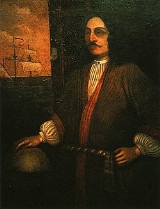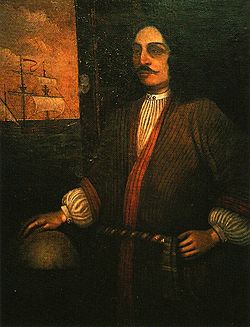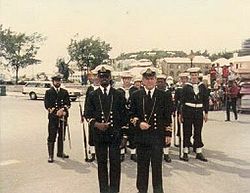
George Somers
Encyclopedia
This article is about the English naval hero. For the American football player, see George Somers (American football)
 Admiral
Admiral
Sir George Somers (1554–1610) was an English
naval
hero. Born in Lyme Regis
, Dorset
, the son of John Somers, his first fame came as part of an expedition led by Sir Amyas Preston against the Spanish
navy in 1595. He is remembered today as the founder of the English colony
of Bermuda
, also known in the 17th century as the Somers Isles.
Somers commanded several English ships between 1600 and 1602, including HMS Vanguard
, HMS Swiftsure
and HMS Warspite
. He was knighted in 1603 and became Member of Parliament
for Lyme Regis the same year.
In 1609, Somers was made Admiral of the Virginia Company
's Third Supply
relief fleet. On 2 June 1609, he set sail from Plymouth
, England
on the Sea Venture
, the flagship of the seven-ship fleet, towing two additional pinnaces) destined for Jamestown, Virginia
, carrying five-to-six hundred people. It is unclear whether that number included crew, or only settlers. On the 25 July, the fleet ran into a strong storm, probably a hurricane, and the ships were separated. The Sea Venture fought the storm for three days. Comparably-sized ships had survived such weather, but the Sea Venture had a critical flaw in her newness, as her timbers had not set. The caulking
was forced from between them, and the ship began to leak rapidly. All hands were applied to bailing, but the water continued to rise in the hold. The ship's guns were reportedly jettisoned (though two were salvaged from the wreck in 1612) to raise her buoyancy, but this only delayed the inevitable. The Admiral of the Company, Sir George Somers himself, was at the helm through the storm. When he spied land on the morning of 28 July, the water in the hold had risen to nine feet, and crew and passengers had been driven past the point of exhaustion. Somers deliberately drove the ship onto the reefs of what proved to be Bermuda in order to prevent its foundering. This allowed all 150 people, and one dog, aboard to be landed safely ashore. The survivors came ashore at Discovery Bay. Somers, along with all those others who had survived the wreck of the Sea Venture, was presumed dead by those who continued on to Virginia, but instead, remained in Bermuda for 10 months. Some commentators believe that this incident was one of the inspirations for William Shakespeare
Somers deliberately drove the ship onto the reefs of what proved to be Bermuda in order to prevent its foundering. This allowed all 150 people, and one dog, aboard to be landed safely ashore. The survivors came ashore at Discovery Bay. Somers, along with all those others who had survived the wreck of the Sea Venture, was presumed dead by those who continued on to Virginia, but instead, remained in Bermuda for 10 months. Some commentators believe that this incident was one of the inspirations for William Shakespeare
’s play The Tempest
.
During their time on the islands, the crew and passengers formed the start of the Bermuda colony, building a church and houses. Somers and Sir Thomas Gates
(also among the castaways) between them oversaw the construction of two ships, the Deliverance and the Patience, from spars and rigging of the wrecked Sea Venture and local timber (Bermuda Cedar
).
In May 1610 the ships set sail, with 142 castaways on board. On arrival, they found the Virginia Colony almost destroyed by famine
and disease during what has become known as the "Starving Time". Very few of the supplies from the Supply Relief Fleet had arrived (the same hurricane which caught the Sea Venture had also badly affected the rest of the fleet), and only 60 settlers remained alive. It was only through the arrival of the two small ships from Bermuda, and the arrival of another relief fleet commanded by Lord Delaware in July of 1610 that the abandonment of Jamestown was avoided and the colony was able to survive.
Somers returned to Bermuda in the Patience to collect more food, but he became ill on the journey and died, on November 9, 1610 aged 56, in Bermuda. Local legend states that he loved Bermuda so much that he requested that his heart be buried there. A marker in Somers' Gardens in St. George's marks the approximate location where his heart was supposed to have been buried. The remainder of his body was taken back to England and buried in his hometown of Lyme Regis.
George Somers (American football)
George Anthony Somers is a retired American football offensive lineman and placekicker. He is one of only two La Salle Explorers to enter the National Football League and the only one selected in the NFL Draft...

Admiral
Admiral is the rank, or part of the name of the ranks, of the highest naval officers. It is usually considered a full admiral and above vice admiral and below admiral of the fleet . It is usually abbreviated to "Adm" or "ADM"...
Sir George Somers (1554–1610) was an English
Kingdom of England
The Kingdom of England was, from 927 to 1707, a sovereign state to the northwest of continental Europe. At its height, the Kingdom of England spanned the southern two-thirds of the island of Great Britain and several smaller outlying islands; what today comprises the legal jurisdiction of England...
naval
Royal Navy
The Royal Navy is the naval warfare service branch of the British Armed Forces. Founded in the 16th century, it is the oldest service branch and is known as the Senior Service...
hero. Born in Lyme Regis
Lyme Regis
Lyme Regis is a coastal town in West Dorset, England, situated 25 miles west of Dorchester and east of Exeter. The town lies in Lyme Bay, on the English Channel coast at the Dorset-Devon border...
, Dorset
Dorset
Dorset , is a county in South West England on the English Channel coast. The county town is Dorchester which is situated in the south. The Hampshire towns of Bournemouth and Christchurch joined the county with the reorganisation of local government in 1974...
, the son of John Somers, his first fame came as part of an expedition led by Sir Amyas Preston against the Spanish
Spain
Spain , officially the Kingdom of Spain languages]] under the European Charter for Regional or Minority Languages. In each of these, Spain's official name is as follows:;;;;;;), is a country and member state of the European Union located in southwestern Europe on the Iberian Peninsula...
navy in 1595. He is remembered today as the founder of the English colony
English colonial empire
The English colonial empire consisted of a variety of overseas territories colonized, conquered, or otherwise acquired by the former Kingdom of England between the late 16th and early 18th centuries....
of Bermuda
Bermuda
Bermuda is a British overseas territory in the North Atlantic Ocean. Located off the east coast of the United States, its nearest landmass is Cape Hatteras, North Carolina, about to the west-northwest. It is about south of Halifax, Nova Scotia, Canada, and northeast of Miami, Florida...
, also known in the 17th century as the Somers Isles.
Somers commanded several English ships between 1600 and 1602, including HMS Vanguard
HMS Vanguard (1586)
VanguardThe 'HMS' prefix was not used until the middle of the 18th century, but is sometimes applied retrospectively was a 32-gun galleon of the English Royal Navy, launched in 1586 from Woolwich, and was the first ship of the navy to bear the name....
, HMS Swiftsure
HMS Swiftsure (1573)
SwiftsureThe 'HMS' prefix was not used until the middle of the 18th century, but is sometimes applied retrospectively was a galleon of the English Royal Navy, launched in 1573....
and HMS Warspite
HMS Warspite (1596)
WarspiteThe 'HMS' prefix was not used until the middle of the eighteenth century, but is sometimes applied retrospectively was a great ship of the English Royal Navy, built at Deptford Dockyard by the master shipwright Edward Stevens, and launched about 1 March 1596...
. He was knighted in 1603 and became Member of Parliament
Member of Parliament
A Member of Parliament is a representative of the voters to a :parliament. In many countries with bicameral parliaments, the term applies specifically to members of the lower house, as upper houses often have a different title, such as senate, and thus also have different titles for its members,...
for Lyme Regis the same year.
In 1609, Somers was made Admiral of the Virginia Company
Virginia Company
The Virginia Company refers collectively to a pair of English joint stock companies chartered by James I on 10 April1606 with the purposes of establishing settlements on the coast of North America...
's Third Supply
Third Supply
The Third Supply was the first truly successful wave of colonization in the first English settlement in the Americas, at Jamestown. It also resulted in the settlement of Bermuda ....
relief fleet. On 2 June 1609, he set sail from Plymouth
Plymouth
Plymouth is a city and unitary authority area on the coast of Devon, England, about south-west of London. It is built between the mouths of the rivers Plym to the east and Tamar to the west, where they join Plymouth Sound...
, England
England
England is a country that is part of the United Kingdom. It shares land borders with Scotland to the north and Wales to the west; the Irish Sea is to the north west, the Celtic Sea to the south west, with the North Sea to the east and the English Channel to the south separating it from continental...
on the Sea Venture
Sea Venture
The Sea Venture was a 17th-century English sailing ship, the wrecking of which in Bermuda is widely thought to have been the inspiration for Shakespeare's The Tempest...
, the flagship of the seven-ship fleet, towing two additional pinnaces) destined for Jamestown, Virginia
Jamestown, Virginia
Jamestown was a settlement in the Colony of Virginia. Established by the Virginia Company of London as "James Fort" on May 14, 1607 , it was the first permanent English settlement in what is now the United States, following several earlier failed attempts, including the Lost Colony of Roanoke...
, carrying five-to-six hundred people. It is unclear whether that number included crew, or only settlers. On the 25 July, the fleet ran into a strong storm, probably a hurricane, and the ships were separated. The Sea Venture fought the storm for three days. Comparably-sized ships had survived such weather, but the Sea Venture had a critical flaw in her newness, as her timbers had not set. The caulking
Caulking
Caulking is one of several different processes to seal joints or seams in various structures and certain types of piping. The oldest form of caulking is used to make the seams in wooden boats or ships watertight, by driving fibrous materials into the wedge-shaped seams between planks...
was forced from between them, and the ship began to leak rapidly. All hands were applied to bailing, but the water continued to rise in the hold. The ship's guns were reportedly jettisoned (though two were salvaged from the wreck in 1612) to raise her buoyancy, but this only delayed the inevitable. The Admiral of the Company, Sir George Somers himself, was at the helm through the storm. When he spied land on the morning of 28 July, the water in the hold had risen to nine feet, and crew and passengers had been driven past the point of exhaustion.

William Shakespeare
William Shakespeare was an English poet and playwright, widely regarded as the greatest writer in the English language and the world's pre-eminent dramatist. He is often called England's national poet and the "Bard of Avon"...
’s play The Tempest
The Tempest
The Tempest is a play by William Shakespeare, believed to have been written in 1610–11, and thought by many critics to be the last play that Shakespeare wrote alone. It is set on a remote island, where Prospero, the exiled Duke of Milan, plots to restore his daughter Miranda to her rightful place,...
.
During their time on the islands, the crew and passengers formed the start of the Bermuda colony, building a church and houses. Somers and Sir Thomas Gates
Thomas Gates (governor)
Sir Thomas Gates , followed George Percy as governor of Jamestown, the English colony of Virginia . Percy, through inept leadership, was responsible for the lives lost during the period called the Starving Time...
(also among the castaways) between them oversaw the construction of two ships, the Deliverance and the Patience, from spars and rigging of the wrecked Sea Venture and local timber (Bermuda Cedar
Juniperus bermudiana
Juniperus bermudiana is a species of juniper endemic to Bermuda. This species is most commonly known as Bermuda cedar although, like most "cedars" it is not a true cedar ; a more botanically accurate name would be Bermuda juniper, but this term is extremely rare.It is an evergreen tree growing up...
).
In May 1610 the ships set sail, with 142 castaways on board. On arrival, they found the Virginia Colony almost destroyed by famine
Famine
A famine is a widespread scarcity of food, caused by several factors including crop failure, overpopulation, or government policies. This phenomenon is usually accompanied or followed by regional malnutrition, starvation, epidemic, and increased mortality. Every continent in the world has...
and disease during what has become known as the "Starving Time". Very few of the supplies from the Supply Relief Fleet had arrived (the same hurricane which caught the Sea Venture had also badly affected the rest of the fleet), and only 60 settlers remained alive. It was only through the arrival of the two small ships from Bermuda, and the arrival of another relief fleet commanded by Lord Delaware in July of 1610 that the abandonment of Jamestown was avoided and the colony was able to survive.
Somers returned to Bermuda in the Patience to collect more food, but he became ill on the journey and died, on November 9, 1610 aged 56, in Bermuda. Local legend states that he loved Bermuda so much that he requested that his heart be buried there. A marker in Somers' Gardens in St. George's marks the approximate location where his heart was supposed to have been buried. The remainder of his body was taken back to England and buried in his hometown of Lyme Regis.
Biography
- Sir George Somers: A Man and his Times, was written by David Raine
- Dorset Pioneers, Jack Dwyer, 2009. The History PressThe History PressThe History Press is one of the UK’s largest local and specialist history publishers, publishing approximately 500 books per year.Created in December 2007, The History Press has integrated core elements of the NPI Media Group within it, including all existing published titles, plus all the future...
ISBN 978-0-7524-5346-0

